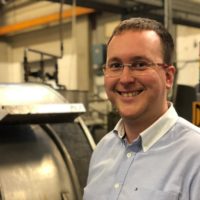Dr Will Wise currently supervises four PhD students and is the academic supervisor on an active Knowledge Transfer Partnership (KTP):
- PhD student – Thomas Garwood (full-time – one year in) – Looking into chromium (VI) detection and prevention in leather. This is a studentship sponsored by The Leathersellers Company and is currently a project with global interest.
- PhD Student – Alberto Bevilacqua (part-time – one year in) – Addressing the removal of chromium from leather waste so that both the metal and the resultant organic material may be recycled/ upcycled.
- PhD Student – Laura Cardaon (full-time – due to start in October 2017) – Looking into sustainability of the leather industry; how do you measure it? What impact does it have on a business?
- PhD Student – Lauren Samet (full-time) – Addressing animal nutrition.
KTP Project – Bryn Webster – Working with an external company “Xeros” on utilising a bead technology as an alternative medium to water for leather manufacture.
In addition to these students, Dr Will Wise has an interest in a sustainable and scientific approach to leather manufacture; this includes: use of alternative solvents, upcycling/recycling leather and leather manufacturing by-products, waste minimisation and understanding the physical and chemical properties of leather at a fundamental level. Many of his projects have been commercially funded in so called ‘private client’ research.
